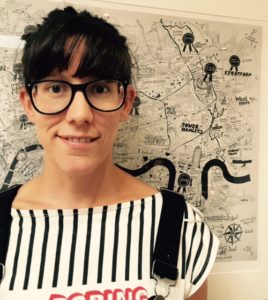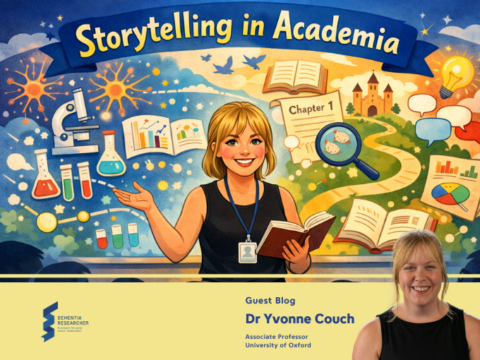In June 2015 I remember sitting in a waiting room, in a large hotel in Leeds, with four men all dressed in suits, feeling like an imposter. I was waiting to go into an interview for my NIHR Doctoral Research Fellowship application I had submitted earlier that year. I couldn’t decide whether to leave my cardigan on or take it off and I felt completely out of my depth. So, I gritted my teeth, decided I had nothing to lose and smiled my way through my interview with a panel of 18 interviewers. A couple of months later I started my NIHR Doctoral Research Fellowship at UCL. I had four years of part time NIHR funding. A dream. When I started my PhD I realised that all the work I’d put in compiling my application, writing in the evenings and at weekends had not only secured me financially (paid my wages, pension, leave, conference fees etc) but also meant I had done a whole heap of work already. I knew what my PhD would look like, when things would happen and who would be involved.
As I came towards the end of my PhD it slowly dawned on me that there was to be another period of applying for research funding. I wanted to continue as a researcher, and though clinical work beckoned I wanted to continue the work I had begun. I still had data to analyse from my PhD, I just hadn’t had time to look at it all. I had new ideas of how to further the work I had begun. I applied for an NIHR Doctoral Skills Enhancement award. Now this one is a bit different from the fellowship application. This is a briefer award- a bit like a bridging award. The aim being to enable you to develop yourself- do any training you need, and benefit from mentorship, in order to prepare for the next application. The DSE application requires you to explain this story, to demonstrate where you are up to and where you are hoping to go. I had to outline my career to date and the research training that would benefit me. Most importantly perhaps I had to ask my employer- the Higher Education Institution where I work to demonstrate their support for me by matching the award. It caught me off guard this time, I applied and was awarded the funding.

NIHR funds approximately 250 Academic Clinical Fellowships (ACFs) and 100 Clinical Lectureships (CLs) in medicine each year.
Now 9 months into my DSE award I have just submitted an application for an NIHR Advanced Fellowship. This is the next step on the ladder of the NIHR research career pathway for me. It’ll be the third application. If successful, this would secure another 5 years of funding for me and my research. It would allow me to continue working on my research with the collaborators and mentors I have chosen. A fellowship feels like a really concrete way of progressing my career.
In the interim I have been successful in applying for other smaller amounts of money through Alzheimer’s Research UK and UCL Grand Challenges. Neither of these were anywhere near the amount of money I asked for in my NIHR applications, but they are also nowhere near as much work. Perhaps it is a good thing to have started my academic career with my NIHR DRF application- alongside my recent advance fellowship application these have felt the hardest. And by the hardest I mean both physically and emotionally. I guess this meant I wasn’t surprised about how much hard work it involved the second time round.
A colleague who was himself applying for an NIHR grant, casually advised me that one must remain relatively sanguine when making an NIHR application. I kind of agree but also don’t agree.
I have found that I had to invest my whole entire self in the writing, otherwise I wouldn’t have got it done. I wouldn’t have persevered through the negotiations with the NHS finance person who costed my NHS costs AND the two university finance departments at both universities involved in my application. I wouldn’t have asked for so much feedback and forced myself to be so thorough if I didn’t really really care. I think I needed to be incredibly invested to get the 55-page application done and submitted. I needed to really really want it. Just submitting it feels like a huge milestone. And now with a couple of weeks distance between the submission process and this blog I have become a bit more philosophical. If I get an interview that would be wonderful. If not, I will try again or try somewhere else.
So, for all those people who are considering this route, be prepared to care in order to get it done. Here are a few more tips and hints that I found to be helpful:
- Find other people, not dissimilar to yourself, who have got this fellowship. Ask them for advice. Meet them if you can (well in advance of starting your own application). They might even share their application with you. If they do that is a massive bonus. You want to see what a recent successful application looks like.
- You’re probably used to writing yourself up, but make sure you have what they want. They will look as you as a candidate. Tell them you have enough publications, tell them how well connected you are, tell them you can influence practice and tell them about all your future destiny as a national or international leader.
- There is a section that asks you to enter any awards you have received (there is a separate section for grants) you can enter academic distinctions such as super special invited talks here too. There is no other spot for talks, so this seems quite handy.
- Try to get your university to contribute some finances toward your ‘cause’ and then showcase it in the application (e.g. paying for a PhD student for you). If your Uni feel you are a good investment it means they are more likely to support you post award too. The NIHR, alongside a number of other funders, have recently criticised the Universities for not supporting people beyond their awards. This will show you are supported.
- Talk to your potential mentors, and existing ones. Talk to anyone who will listen, but preferably people with some knowledge of the areas you are both more and less confident about for your project plan. I recommend doing this before you get your ideas on paper as well as during their writing phase.
- Get in touch with the Research Design Service- they can offer a different viewpoint and have insight to what the NIHR like. When you do this – send them your entire application not just the research project bit (a mistake I made). They can advise on the entire thing.
- Link your work to current NIHR priorities- and state that your work links to these things. Use NIHR language to do this.
- Address EDI and underserved populations- state how you have included them and how this aligns with NIHR priorities on including these groups. And if not why not.
- Do not forget about your PPI plan- it is much more important than many people think it is. Make sure you account for the work in your finances. Basically PPI will happen throughout your project and you need to ensure it is not tokenistic.
- Think about your training plans carefully- talk to your mentors and do an assessment of your current needs. Then say you have done this and explain how your training plan fits with the project.
- Use the tools you have available to make your writing clear- use underlining, bullet points, italics and bold. It will help the reviewers pick out the important bits.
- Chase your mentors and all those who need to sign things off. Make sure it happens- don’t hesitate to bother them.
- And once it is submitted start pedalling back emotionally to that sanguine state.
Author
Dr Anna Volkmer is a Speech and Language Therapist and researcher in Language and Cognition, Department of Psychology and Language Sciences, University College London. Anna is researching Speech and language therapy interventions in language led dementia and was once voted scariest speech and language therapist (even her children agree).

 Print This Post
Print This Post




